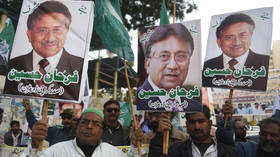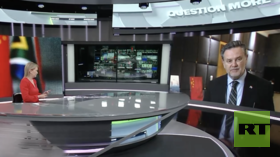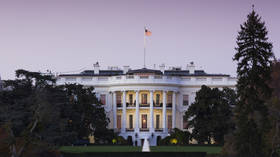New Delhi, beware of Americans bearing gifts and promises!
India is upbeat following talks in the US, where political and defensive initiatives were laid out amid a climate of tension between the US and China. But can Washington be trusted to live up to its end of the bargain?
Judging by Washington’s dismal track record for trashing treaties and agreements, it’s hard to imagine that American diplomats have much work to do these days. As many countries have come to understand, there are certain risks involved when negotiating with a partner that has a reputation for reneging on its promises.
Indian diplomats certainly did not forget those flawed character traits of the US superpower as they sat down in Washington for the so-called ‘2+2’ dialogue, designed to deepen strategic relations between India and the United States. Any apprehensions the Indian delegation may have had were likely amplified by the participation of US Secretary of State Mike Pompeo, who recently reminisced about his good old days as CIA director when he confessed “we lied, we cheated, we stole.” Those are hardly comforting words to contemplate when entering into talks with anyone, including allies.
At the #USIndia 2+2 Ministerial we explored ways to deepen our shared security, advance a free and open #IndoPacific region, and expand economic prosperity. These efforts, all built on the foundation of a strong strategic partnership, will benefit the people of both our nations. pic.twitter.com/r2tK2iZZKb
— Secretary Pompeo (@SecPompeo) December 18, 2019
The one-day talks focused attention on the question of “cross-border terrorism,” a perennial topic for all countries nowadays. Indian Prime Minister Narendra Modi, who is currently pursuing a more nationalist agenda - as witnessed by recent events in disputed Kashmir - may have some reason for considering how to preempt acts of terrorism. After all, two of the three wars Pakistan and India have engaged in since acquiring independence from British colonial rule were over Kasmir, which is the only Indian territory with a Muslim-majority population.
To complicate matters, India has also just passed the so-called Citizen Amendment Act, which grants persecuted minorities living abroad a fast-track path to Indian citizenship. The law applies to Hindu, Christian, Buddhist and other religious groups, but excludes Muslims from consideration.
Needless to say, the slightest provocations could turn this region of the world into a hotbed of violence.
Also on rt.com ‘Prophetic words’: Pakistani PM Imran Khan hails quote from ‘The End of India’ book amid citizenship law protestsHere is where Modi must tread carefully. After all, it is no secret that the United States has some experience and expertise in manipulating divisions inside of countries for strategic gain. This was evident during the years-long Syria conflict, where the US military illegally entered the country on the premise of fighting against Islamic State terrorists. This was nothing more than a pretense to lend assistance to the Syrian opposition in bringing down the government of President Bashar al-Assad. Eventually, the situation was normalized and Damascus maintained its independence thanks to the 11th-hour intervention by the Russian military.
And then there is the question of China, the uninvited elephant in the room during the US-India negotiations. There is no doubt that Washington hopes to capitalize on the decades-long feud between India and China to bolster its own fierce power struggle with Beijing.
With experts predicting that the US-China economic and military showdown could linger for at least another decade, Washington will be looking for regional allies, and India, given its close proximity to China and troubled past with Beijing, is the most obvious candidate. To those ends, the Indian delegation signaled its intent to increase defense spending on US military hardware, one example being the Romeo helicopters, which are designed to take out submarines and ships. China must view these sort of military contracts between the US and India with some alarm, which will in turn force Beijing to respond in some way.
Also on rt.com Great game in Washington? India dancing with the US bison, hugging the Russian bearSince the last thing India wants is to provoke any sort of confrontation with China, it will certainly be weighing every move it makes with Washington, while keeping in mind the latter’s reputation for ditching allies for strategic reasons. After all, even NATO members are not exempt from feeling the wrath of the global superpower if they stray too far from the herd.
Turkish President Recep Erdogan discovered that the hard way when he announced Turkey would buy a batch of Russian-made S-400 air defense systems instead of Raytheon’s Patriot missiles. Now Istanbul is set to become the next country to suffer harsh economic sanctions from the Trump administration.
Despite being embroiled in impeachment proceedings against Donald Trump, the US Senate found time this week to pass a massive $738 billion defense spending bill that includes several measures aimed at punishing Turkey. The legislation denies Turkey participation in NATO’s F-35 fighter jet program, while lifting a US arms embargo on Greek-administered southern Cyprus, which has long been a thorn in the side of Istanbul. It also slapped sanctions on shipping companies used to construct the Turkstream and Nord Stream 2 pipelines. If Erdogan thought he could become a NATO member while still maintaining some independence over his nation’s foreign policy, he was sorely mistaken.
Also on rt.com If Trump is a threatening tyrant, why did Democrats just agree to give him $730bn for the military?Another country that got burned in its dealings with Washington was the Islamic Republic of Iran. Following a series of lengthy negotiations between Iran and the P5+1 (the US, the UK, Russia, France, and China—plus Germany), Tehran signed on to the Joint Comprehensive Plan of Action. The deal called for Iran to dramatically reduce its nuclear facilities in exchange for the lifting of economic sanctions, thereby releasing tens of billions of dollars in oil revenue and frozen assets.
No sooner was the ink on the agreement dried, however, than the incoming Trump administration – despite vociferous criticism from its European partners - declared the agreement null and void. Although a better deal may eventually emerge from the ashes, it nevertheless does little to assuage fears that Washington simply is not a partner to be trusted.
Russia has also experienced American flip-flopping firsthand, and as early as those delirious moments following the collapse of the Soviet Union when the Berlin Wall was being knocked down with sledgehammers.
In 1990, Soviet leader Mikhail Gorbachev agreed to the reunification of Germany, and its alignment with NATO, on the condition that the US-led military pact would not advance “one inch eastward” towards Russia. Today, the anachronistic military bloc has not only doubled in size, it is double-parked smack on the Russian border.
The double dealings on the part of Washington did not stop there, of course.
In 2003, George W. Bush announced the US would withdraw from the Anti-Ballistic Missile Treaty, which had successfully served to prevent a nuclear arms race on the European continent for 40 years. After trashing the historic document, the US was free to build a missile defense system in Eastern Europe, a stone’s throw from the Russian border. That decision is solely responsible for Russia introducing a number of defensive measures in an effort to maintain regional stability.
Also on rt.com ‘Listen to us now’: Putin unveils new Russian nuclear arsenalIndia is certainly aware of this unfortunate trend that weaves itself throughout US history; Washington has a marked tendency to ingratiate itself with foreign countries only when it stands to gain something. And once the prized objective is met, the ‘ally’ is quickly forgotten like yesterday’s cold leftovers.
Of course, all countries should be free to deal with America as they see fit, but would do well to proceed in accordance with a time-proven caveat: ‘America’s interests come first, therefore this agreement is subject to termination at any time and place that Uncle Sam deems appropriate.’
Think your friends would be interested? Share this story!
The statements, views and opinions expressed in this column are solely those of the author and do not necessarily represent those of RT.















